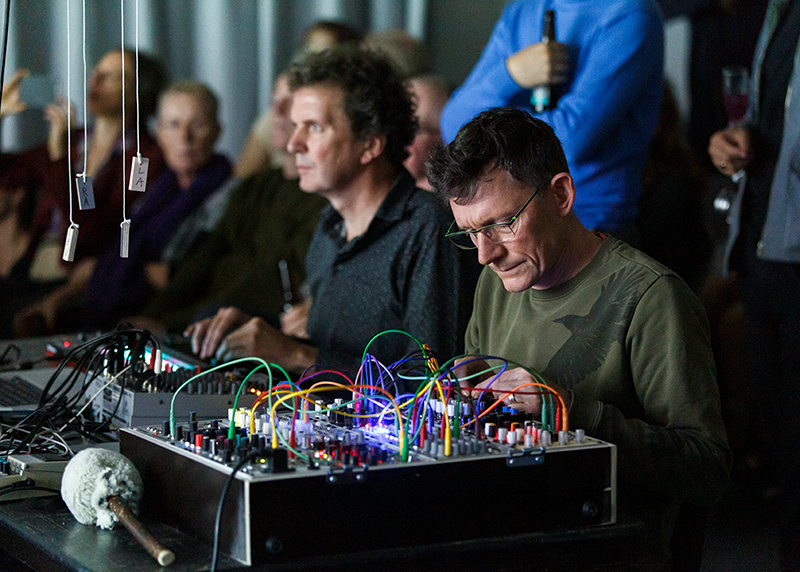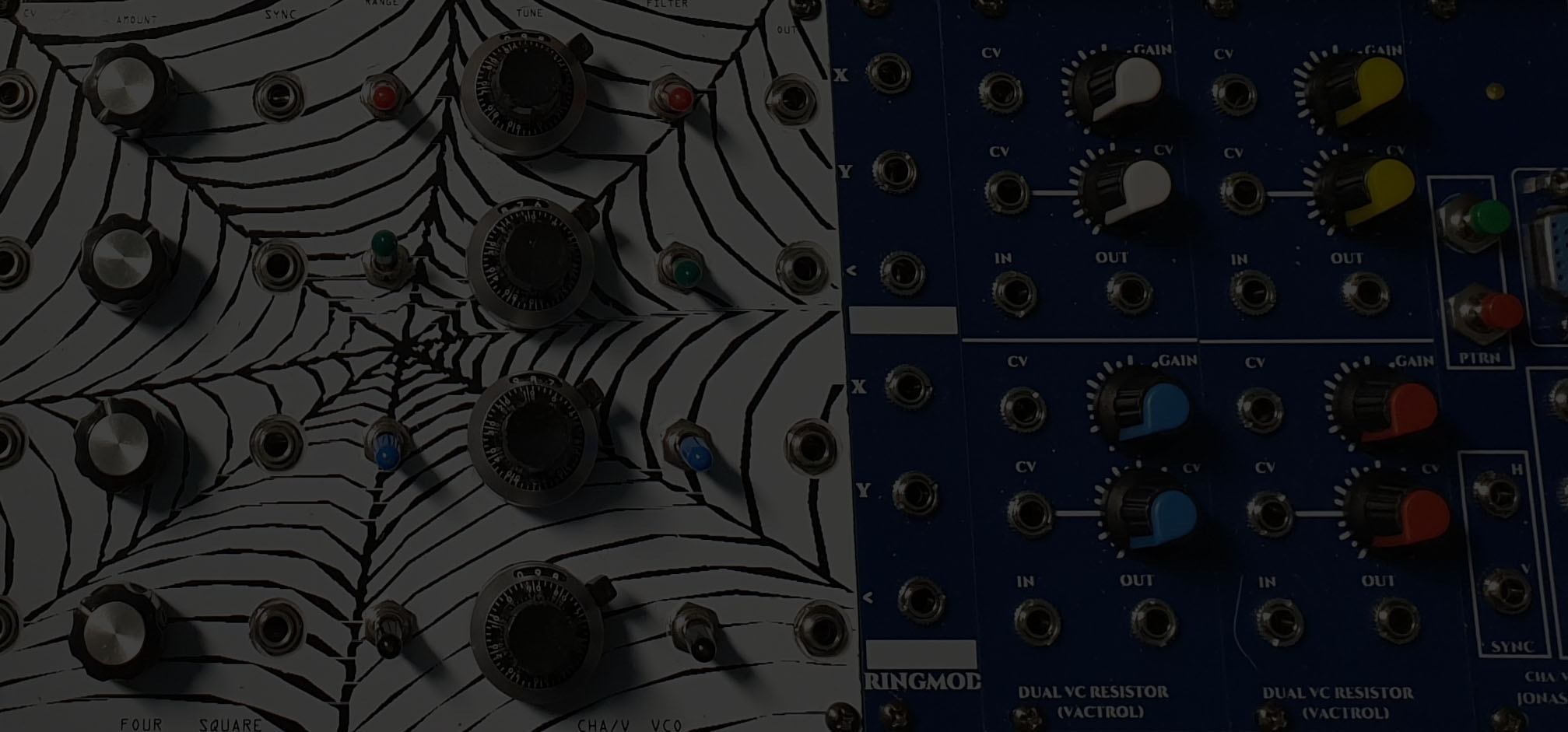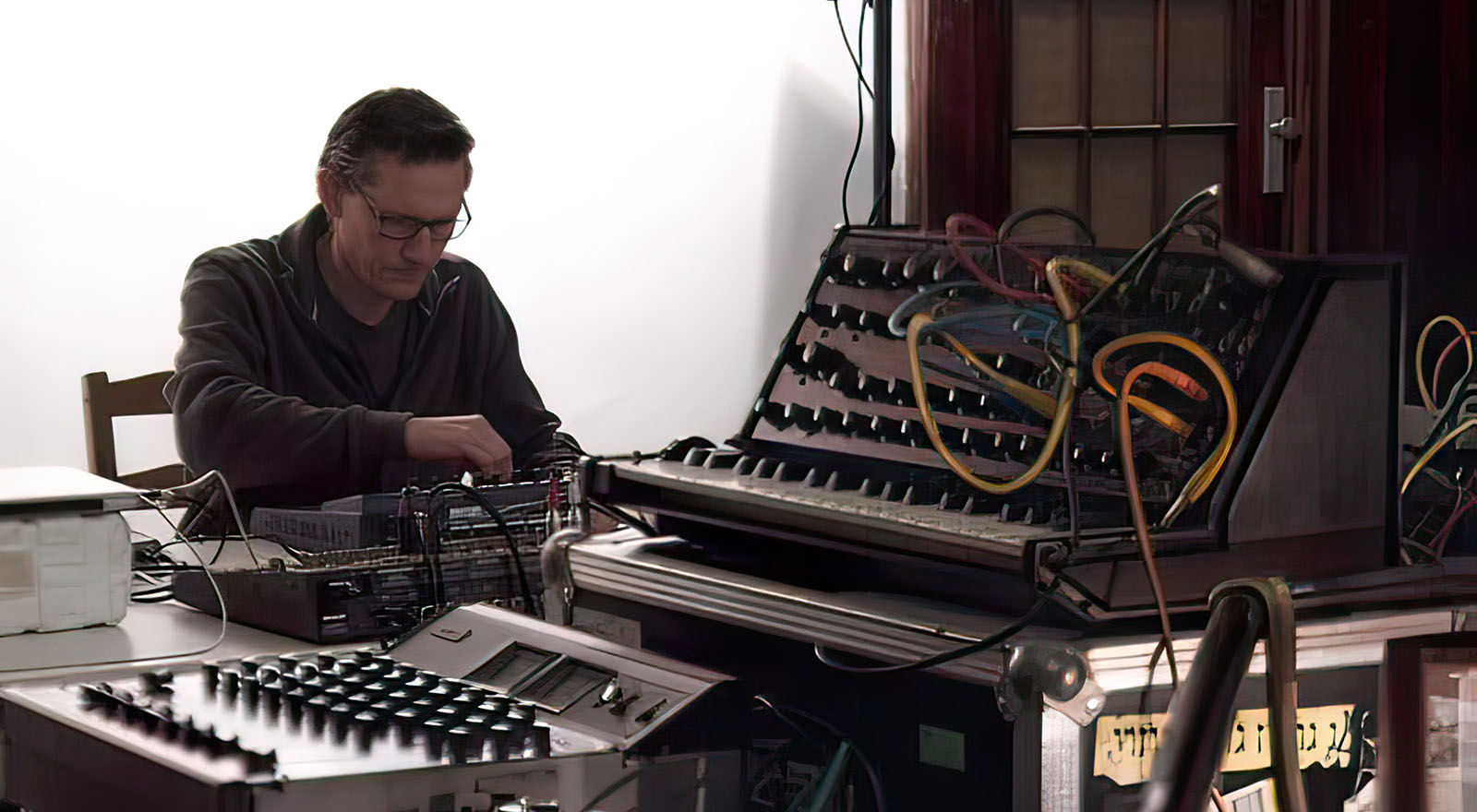
Happy to welcome Roel Meelkop whom I had the pleasure to start working with in the late 90s when his GOEM trio graced the very first BiP_HOp Generation volume. Born in 1963 he comes from Rotterdam, The Netherlands.
His musical activities date back to the early eighties when he started THU20, together with Jac van Bussel, Peter Duimelinks, Jos Smolders and Guido Doesborg. THU20 have released several tapes and CDs and performed regularly in Europe.
Since then he has worked steadily on a body of work, most of which was received enthusiastically in the small but dedicated world of sound art. His other activities include working with Kapotte Muziek, Wieman (both with Frans de Waard) and Pierdrie (with Machinefabriek and video artist Marco Douma).
Recently he has worked with filmmakers Esther Urlus and André Schreuders and long-time friend and collaborator Jos Smolders (MeSm).
He has also been digging into the universe of modular synthesis…
What have you been working on lately, and do you have any upcoming releases or performances?
Lately I have been working extensively on recording patches with my synths and using those in new works. Some of these pieces are exclusively constructed with these recordings. In others, I have combined these tracks with field recordings and other sounds, mainly percussion in it’s broadest sense.
Besides this I have been working on the sound design of a documentary film by theatre maker Tea Tupajovic that will be screened in a special program at the International Documentary Film Festival Amsterdam.
I have some upcoming releases, one of which is a collaboration CD with Das Synthetische Mischgewebe on Flag Day Recordings, as a result of the Dutch tour that we did together in 2019.
Another CD will be released on Esc.Rec, it’s again a colaboration with video artist Marco Douma, spanning almost 6 years of working together and resulting in a limited edition of CD with booklet.
Next year should see the release of an LP on Erototox Decodings.
Performances are very scarce these days, we all know why of course. I have a performance lined up in December, a collaboration with Esther Urlus, who is well known for her work with 16mm film loops.
Other than that I will be doing the sound design for a film by artist Ine Lamers and probably some more work with several video artists.
You had started composing Electronic music in THU20 about 40 years ago, how was the scene back then? Was Industrial crossing to Electroacoustic like it had for the past 20 years or barriers existed and stay closed? What are the changes which took place throughout the decades?
Since none of the members of THU20 had any kind of academic background in music it was not evident for us to seek access to the scene that programmed this kind of music. For some of the members the interest in contemporary music was strong, for others less so. So it was natural for us to move around in the industrial or alternative music scene. What has been very important for most of us is the DIY approach: learn by doing, just start things and see if the results are rewarding. This more or less punky attitude set us apart from the academics as well of course. The need for trying to cross over was not so strong, because there was a lively international scene of independent organisers who granted us access to an audience at festivals and alternative peformance spaces. At some point the academic world became somewhat interested in the industrial culture, but this doesn’t seem to have lead to a fruitful continuation. I believe that the industrial scene has always set itself willfully apart from other scenes. From my own point of view I have always tried to stay true to my own desires for making music. This has led to projects such as Kapotte Muziek and GOEM, but also to slo-fi and Wieman. These different attitudes towards music to give an accurate picture of my work. If any changes have occurred during the last years it is probably that I have become more free in my use of techniques and expressions.
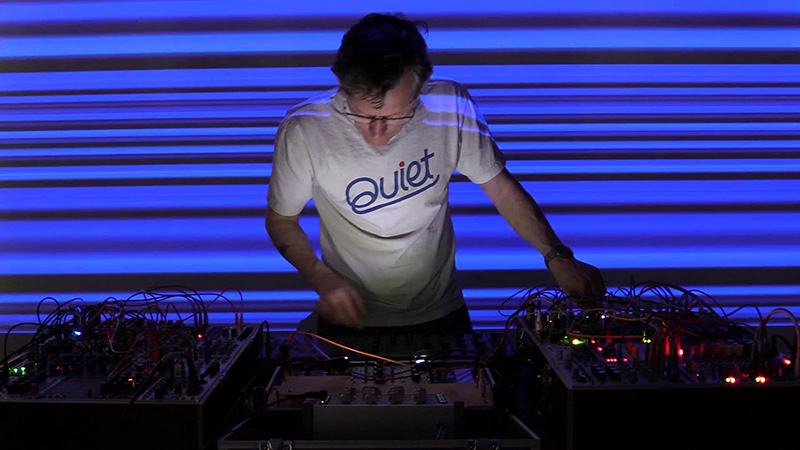
How were you first acquainted to Modular Synthesis? When did that happen and what did you think of it at the time?
How does it marry with your other « compositional tricks »?
It was of course my good friend Jos Smolders who lured me into the modular world three years ago. I was looking for new ways of approaching live work besides the use of laptop and controllers. He suggested trying modular becuase of its vast opportunities and its hands on controll. He set me up with a couple of unused modules and we spent an afternoon introducing me to the concept of modulation. I got the basics then and am tryning to broaden my knowledge ever since. At first I was scared by all the possibilities that modular systems provide. But thanks to Jos explaining the basics I was able to overcome this fear and dive into it.
It pairs well with my other compositional methods, basically because I see all sounds as possible material to work with. So in general I will patch around until I have found something that appeals to me and I record this. In a later stage I will sit in my studio and see how these recordings combine with field or instrumental recordings. Then I start composing. This may lead to searching for specific sounds on the synths or making additional field or instrumental recordings. It’s an ongoing process.
When did you buy your first system?
What was your first module or system?
How long did it take for you to become accustomed to patching your own synthesizer together out of its component parts?
Well, as I mentioned above, my first system was made up of some basic modules that Jos Smolders didn’t have use for at the time, now about three years ago. It consisted of a few utlities and oscillators (mainly Doepfer) and that’s it. I tried to find out what this was all about and quite soon found that I liked the way this equipment can be handled. Soon after that I started looking into other modules around and was pretty shocked to find out how expensive this could turn out to be. So that’s the reason I began searching for cheaper options and found out about kits. Since I have some soldering skills I tried my luck and this worked pretty well. After making kits I started sourcing my own parts and have been doing so ever since. I have collected a pretty big setup now and can keep soldering for a while to come.
Patching became easier once I learnt how things work and influence each other. I can now work out some sounds in my mind and create the patch to produce it (does not always work, I must admit). In all I think it took me about a year to understand the basics of modulation. However, I am not using the synth to its fullest, for me it’s still basically a sound creation tool and less a music creation machine.
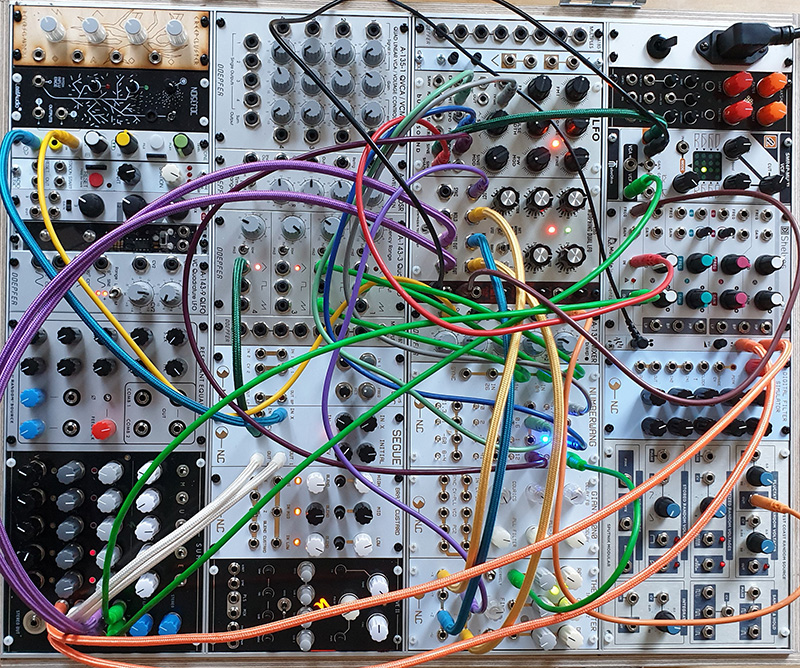
What was the effect of that discovery on your compositional process?
On your existence? You chose not to us modular only so what are your other weapons of importance ?
Modular synthesis opened up a vast new territory of sounds for me to explore and use. Besides, the quirky and chaotic behaviour of some of my favourite modules showed me paths to new compositional approaches. The effect on my existence is certainly one of enrichment, although it also weighs heavily on my wallet. Sound in its broadest sense is my material, I have always used as many sources as were available to me: field recordings, synthesizers, effects, instruments and trash. The way for me to create my works is using computer and software, notably Reaper for studio purposes and Audiomulch with midi controllers for live purposes. Besides these I have almost always (ab)used instruments, effects and other materials in live situations.
Quite often modularists are in need for more, their hunger for new modules is never satisfied? How do you explain that?
Having stepped into the rabbit hole I can understand the craving for new modules for several reasons: there are always new releases with new opportunities; other modules create other possibilties. I think one can not really ever be satisfied as module designer develop new ways of working with sound. And we also develop ourselves, ceating a need for new ways of working and exploring. I know of many people who buy new modules only when they have sold old ones. In that way they can keep exploring.
Instrument building may actually be quite compositional, defining your sonic palette, each new module enriching your vocabulary. Would you say that their choice and the way you build your systems can be an integral part of your compositional process? Or is this the other way round and you go after a new module because you want to be able to sound-design some of your ideas?
Do you prefer single-maker systems (for example, Buchla, Make Noise, Erica Synths, Roland, etc) or making your own modular synthesizer out of individual components form whatever manufacturer that match your needs.
I believe my system is mainly based on the idea that modules can create sounds and compositional events that I haven’t thought of before, but the other way around works well for me too: sometimes I have something in my mind and I will look for the module that can do this. And there is always a fruitful cross contamination going on. One just has to keep the ears open. My system is made up of many different brands, mainly because I built most of them myself. Within that context I must say that Nonlinear Circuits and ST-Modular are among my favourite brands, NLC mainly because of the various chaotic circuits and ST-M because of the really cool utilities. NLC also meets my taste for a nasty, gritty and dirty sound. The pleasure of building my own modules is certainly a big part in the fun of working with modular synths.

How has your system been evolving?
The development of my modular system was first based on getting to know modulation and adding the type of modules I needed and afterwards extending my skills with different types of modules. After three years I am beginning to feel quite confident about it and think I may actually have enough modules to keep me going for a long while. Having said that: if something new comes out with features i haven’t seen yet, it’s always very tempting to add that to the collection of course.
Do you tend to use pure modular systems, or do you bring in outside effect and devices when playing or recording?
For the last years I have been focussing on working with my modular system, to get to know it a bit. But I have never really restricted myself in any sense musically. Whatever works is welcome, either live or in the studio.
Would you please describe the system you used to create the music for us?
Can you outline how you patched and performed your Modulisme session?
The music in these three tracks is made up of many different patches, my photo’s show some of the modules used. But i also included a recording from the Blippoo (borrowed from Jos Smolders). So this is not a single session, more a constructed collection of many different sessions. Therefore it’s impossible to describe the system or the patches used.
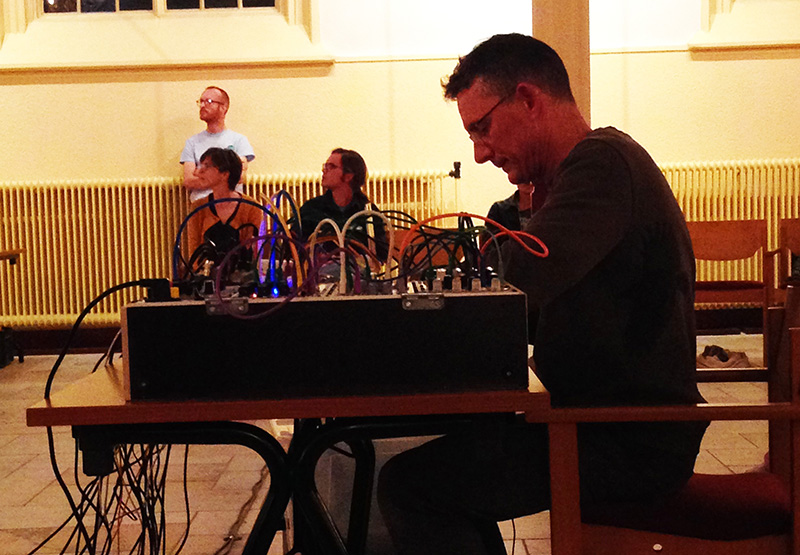
What do you think that can only be achieved by modular synthesis that other forms of electronic music cannot or makes harder to do?
What modular synthesis has basically showed me is the infinite possibilities of generating and processing sound and making these things interact with each other. Computers, synthesizers, effects all have their characteristics, but the possibility of just patching everything together until something interesting emerges is very rewarding. The sounds that are thus created can hardly be imagined, that’s also very satisfying.
What would be the system you are dreaming of?
I don’t think there is actually a system that I am dreaming of. As long as I can produce and collect the sounds that I can work with I am happy. Of course there are always modules that are financially out of my league, so I need to work around that. I prefer a wide range of lesser possibilities than one module wtih a very good, but limited set.
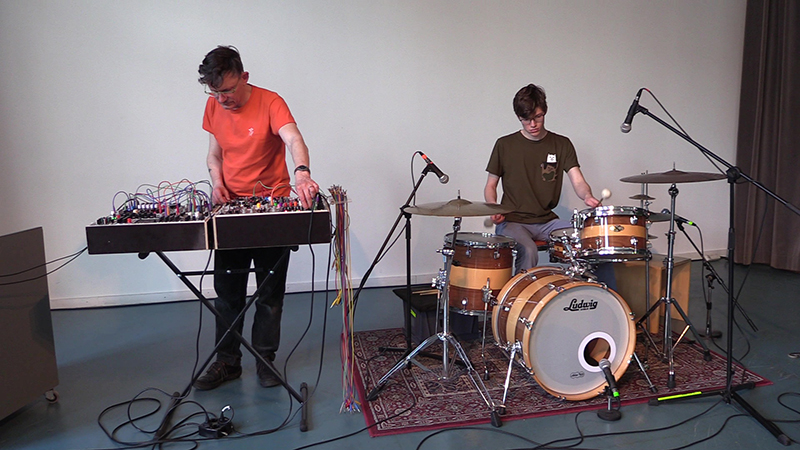
Still working with Jos Smolders whom you have known for decades… Are you feeling close to some other contemporary Modularists?
Which ones?
Which pioneers in Modularism influenced you and why?
Indeed, still working with Jos Smolders, in different ways. But we also sometimes just have a chat and a coffee. To be honest I don’t know too many Modularists really. Listening to Modulisme is my main channel here. I like many kinds of music, but have a definite preference for a somewhat dry approach, not too many effects involved, especially reverb, that’s a real killer for me. I don’t know if the old German bands count as modular pioneers, but they defenitly had an impact: Kraftwerk and Tangerine Dream, especially in my teenage years, before Punk and New Wave. Kraftwerk mainly because of their popular aproach to electronic music, without losing their quirkiness. Tangerine Dream because of their long and slowly developing soundscapes. I am sorry not coming up with more recent examples, I have to catch up on a lot I’m afraid.
Any advice you could share for those willing to start or develop their “Modulisme” ?
First thing to do: get a crash course in the concept of modulation, the way Jos Smolders explained to me what the whole idea behind this patching is. Once this is a bit clear, start watching tutorials and other video’s about modulation and modules. There are tons out there. And of course listen to what others are doing, always. It’s very easy to get lost in the endless possibilities of modulation, so it’s good to be weary of that. But in the end the main thing is that you’re having fun doing it.
